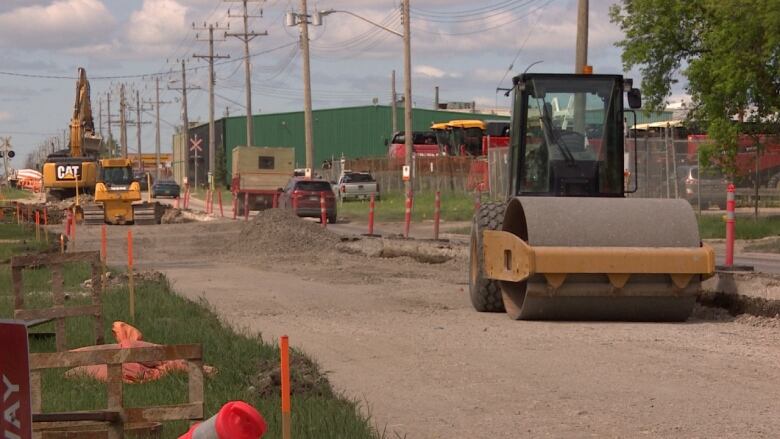As construction season starts, city says 24/7 work could be complex, costly
Manitoba Heavy Construction Association says nighttime construction would be tough to implement

As roadwork season kicks into gear, the City of Winnipeg and a provincial construction association sayextending all worksiteoperation hours into the night could be complicated, costly and more dangerous.
The idea of night construction has been floated in the past by Mayor Brian Bowman and some city councillors, and a national business federation says it could make a difference for small business owners feeling the pinch of construction in their area.
"Especially those in industrial areas where there aren't a lot of residents around, that night construction could be a great tool to help speed up these projects," said Jonathan Alward, director of provincial affairs for Manitoba with Canadian Federation of Independent Business.
"And ultimately that's going to be a huge benefit for small businesses, if a project can get done in a season instead of two."
The president of the Manitoba Heavy Construction Association, however, said it would be tough to implement.
"In the Winnipeg context and reality, it would be very difficult, indeed, to expand the construction-day schedule as a routine practice, especially as it relates to evening [and] nighttime construction work," said Chris Lorenc, the president of the association, in a written statement.
"Winnipeg's noise bylaws alone would prevent expanding the construction hours."
A spokesperson for the City of Winnipeg said noise isn't the only reason nighttime construction shouldn't be mandated.
"The safety of workers and the travelling public is reduced for operations after dark," the spokesperson wrote in an email.
He added that 24-hour operations require two or three separate crews to staff, and that mandating the practice in contracts could prompt contractors to charge more, asking for premiums to cover risk at night or extended hours.
The city sometimes requires or permits contractors to run construction operations through the night, he said, but usually only for tasks that must be done in quick succession or in a short time period, or if there's a specific benefit to the city and public.
"The benefit must outweigh the risks and costs," he wrote.
When weekend work is planned, it's usually done based on traffic, he said, like the closure of the Arlington Bridge scheduled for this weekend for inspection and maintenance.
'A huge issue'
Night construction also isn't on the list of five strategies suggested by the Canadian Federation of Independent Business to mitigate roadwork's impact on small businesses.
The list was compiled following a survey that found many small business owners were affected by construction in their area, Alward said.
"It's a huge issue and we've been hearing this for years from small business owners not just across Winnipeg, but Manitoba and all across the country," he said.
Alward called the ideas "common sense approaches."

"It could be letting small businesses put signs out on the road easier, just to let customers know that they're open, or doing a better job of letting customers know how to get to a particular street of businesses if one lane of the street is no longer accessible," he said.
The five elements include creating a municipal compensation program for businesses hit the hardest, and a "no surprise" rule requiring cities to track infrastructure's condition and let businesses know when construction is coming well in advance.
The other three recommendations are to embrace a comprehensive planning approach, improving contracting processes with bonus and penalty systems for early or late completion and bringing in a "business liaison officer" to work with businesses and construction site managers.












_(720p).jpg)


 OFFICIAL HD MUSIC VIDEO.jpg)
.jpg)



























































































